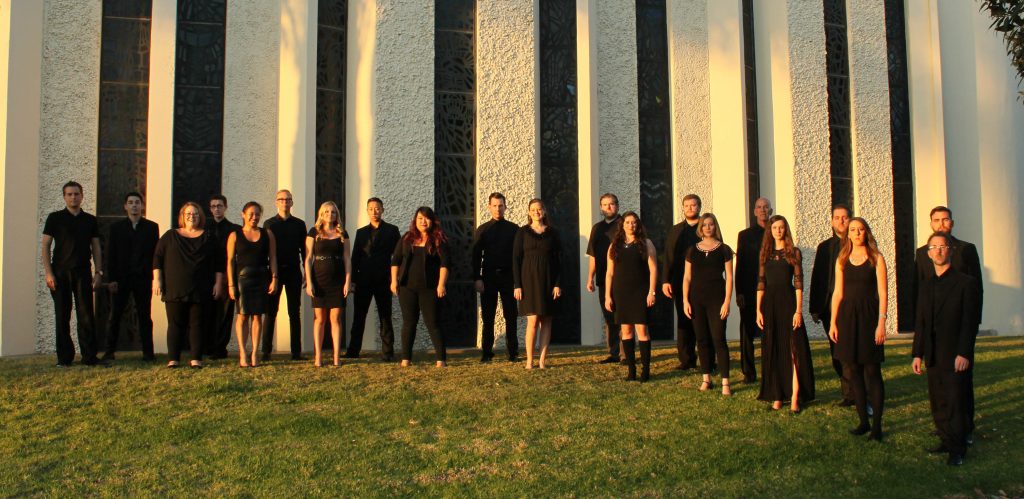Pro Arte Voices’ Sophisticated Choral Salute to Christmas
As the days draw near to December 25, choral performances in San Diego multiply significantly. And while the options increase, the caliber of the music offered can vary greatly, so experience has taught me to be selective. I have learned to rely on two organizations: the Bach Collegium San Diego’s annual period instrument Messiah and the Pro Arte Voices’ annual Lessons and Carols service, which they title “An Evening of Readings and Carols.”
Pro Arte Voices Artistic Director Patrick Walders’ Saturday (December 16) program offered a generous portion of English sacred music from the last century: works by Benjamin Britten, Peter Warlock, Peter Racine Fricker, and Herbert Howells, a completely defensible choice considering the lessons and carols tradition originated at England’s prestigious King’s College, Cambridge, exactly 99 years ago.But before I dive into this Anglophile trove, allow me to tout two non-English choral works on this program that stood out handsomely, Latvian composer Ērik Ešenvalds’ “O Emmanuel” and the late American composer Stephen Paulus’ “Splendid Jewel.” Ešenvalds’ motet begins with an almost voluptuous mezzo-soprano solo accompanied by soft humming, but it soon opens up into a gleaming full-choir tapestry that brought to mind Eric Ericson’s shimmering Nordic choral sonorities. Only Ešenvalds’ curvaceous melodic lines softened the austere edge easily associated with Swedish choral music.
A majestic hymn to the Virgin Mary, Paulus’ “Splendid Jewel” explodes with resounding chordal declamation that deepens the text by rich, incrementally expanding harmonic shadings. Pro Arte Voices’ vibrant sonority, immaculate ensemble, and palpable emotional investment gave these motets irresistible allure.
One of Howells’ later sacred works, “Long, Long Ago” from 1951 is based on a pacifist poem by John Buxton. Of the British choral works on this program, it struck me as the most dramatic and sophisticated, opening with mystical, modal harmonic waves the suddenly turn into a tidal wave of bold declamations. The absolute security with which Pro Arte Voices navigated these perilous waters is a tribute to Walders’ demanding preparation and pristine, unfaltering direction.
A music critic, early music scholar, and self-taught musician, in Britain’s roaring twenties, Philip Heseltine found modest amounts of time to compose between his youthful bouts of drinking and sex. His Latin carol “Benedicamus Domnio,” composed under his usual pseudonym Peter Warlock, translates the ribald energy of a pub fight into an exuberant tapestry of choral shouts with bold, symphonic gestures, although the short-lived Heseltine never got around to writing a symphony. Not surprisingly, Pro Arte Voices made the most of this extroverted escapade on the Nativity narrative, as they did to another rousing Nativity choral offering by Peter Racine Fricker, “A Babe Is Born”
I have always held Britten’s “Hymn to the Virgin” in high esteem, but in the company of Warlock, Howells, and Fricker, the work sounded wan–not because the choir’s deft and finely detailed performance, of course! Perhaps Pro Arte Voices will give us their take on Britten’s more extroverted Christmas offering “A Ceremony of Carols” in the future.
No lessons and carols endeavor is complete without festive arrangements of traditional English carols that allow the audience to participate, and Walders wisely chose sumptuous arrangements by David Willcocks that gave the chorus a crown of counterpoint above the familiar carol tunes. Before his death in 2015, David Willcocks was the dean of British choral music, and his elegantly crafted hymn arrangements for chorus, brass, organ, and congregation have long set the standard.
Organist Justin Murphy-Mancini accompanied these carols with rhythmic vigor and colorful registrations that supported but never overpowered. In the prelude to the lessons and carols service, Murphy-Mancini played J.S. Bach’s Canonic Variations on the German Christmas Carol “From Heaven Above to Earth I Come,” BWV 769. Sadly, the audience at St. Andrew’s Episcopal Church talked so loudly, they could not possibly have enjoyed his virtuoso account of Bach’s great work. Fortunately, I heard him play these Canonic Variations in a solo recital last week at the First United Methodist Church of San Diego, so I can affirm without reservation the artistry that the audience members missed for the sake of their superficial chatter.
According to Walders’ introduction to the performance, this December’s Evening of Readings and Carols marked the event’s fifth consecutive year at the Pacific Beach church. I believe this year marked my third experience, and I am happy to report that each iteration has shown a more assured progression of the events’ many moving parts and a continued deepening of the interpretive prowess of the Pro Arte Voices.
This performance by the Pro Arte Voices was presented December 15, 2017, at Rancho Santa Fe’s Village Community Presbyterian Church and December 16, 2017, at St. Andrew’s-by-the-Sea Episcopal Church in San Diego’s Pacific Beach. The December 16 performance was reviewed here.

